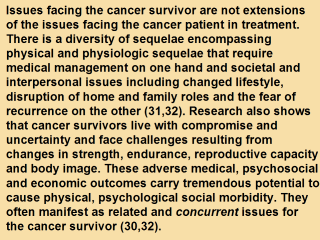 |
Issues of
particular importance to cancer survivors include the risk of recurrence;
follow-up care and surveillance for the adverse sequelae of treatment and
the development of new cancers, reproductive issues and sequelae in
offspring; and quality of life and psychosocial adjustment beyond acute
treatment (30,32). Not only do these issues occupy a central core of
importance in and of themselves, they also can influence infrastructure
systems such as databases, follow-up requirements for clinical trials, new
therapeutic approaches, surveillance recommendations and the cancer research
agenda itself (10,33–35). Decisions concerning needs for specific follow-up
care benefit from information derived from studies of the medical and
psychological outcomes of both the cancer experience and therapy. Providing
information, education and other forms of intervention during active cancer
treatment and beyond may have implications for the prevention of future
illness and for the overall quality of life of survivors. Cancer survivors
are also a rich source of information on consequences of the cancer
diagnosis and treatment, such as second cancers and potential
comorbidities. (4,10,30) |
